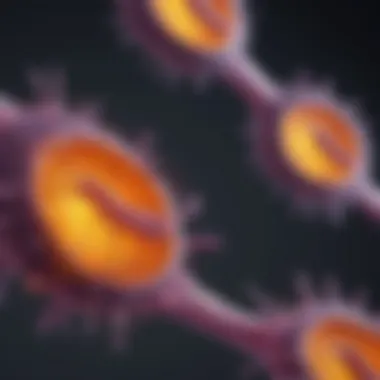Understanding Progressive Pancreatic Cancer: Insights & Advances


Intro
Pancreatic cancer remains one of the most formidable challenges in oncological research and clinical practice. It often progresses unnoticed for a long time, with symptoms that are frequently vague in nature. As the disease evolves, patients may face severe and debilitating consequences. Understanding this cancer's progressive nature is vital for healthcare practitioners, researchers, and patients alike. It can lead to improved diagnostic measures and therapeutic strategies. This section outlines the fundamental aspects of progressive pancreatic cancer and sets the stage for a more detailed examination of its various components.
Methodology
Study Design
This article synthesizes existing literature related to progressive pancreatic cancer. The study incorporates a comprehensive review and analysis of peer-reviewed articles, clinical trials, and recent advancements in the field. The goal is to present a coherent narrative that encapsulates the biological, clinical, and therapeutic aspects of this disease.
Data Collection Techniques
Data was collected through a systematic search of electronic databases such as PubMed, Scopus, and Google Scholar. Keywords were chosen carefully to ensure a wide-ranging collection of data. Topics included biological markers, treatment efficacy, and patient care strategies.
Discussion
Interpretation of Results
The complexity of pancreatic cancer demands a multi-faceted approach to understanding its progression. Research indicates that genetic mutations and epigenetic changes play significant roles in tumor behavior. Additionally, the tumor microenvironment can influence therapy resistance and metastasis.
Limitations of the Study
While this article aims to provide an in-depth look at progressive pancreatic cancer, certain limitations must be acknowledged. The focus on existing literature means that real-time clinical data may not be adequately represented. Moreover, advancements in treatment options are rapidly evolving, potentially outdating some included studies.
Future Research Directions
Emerging research suggests that precision medicine could vastly improve outcomes for patients with pancreatic cancer. Further investigation into personalized therapies tailoring treatment based on individual genetic profiles is needed. Additionally, understanding the synergy between various treatment modalities will likely enhance therapeutic efficacy.
"Pancreatic cancer is a complex disease requiring innovative solutions to improve patient outcomes."
By exploring the underpinnings of progressive pancreatic cancer thoroughly, this article aims to foster a better understanding among the readership and contribute to advancing knowledge in the field.
Prelims to Pancreatic Cancer
Pancreatic cancer is a complex and often fatal disease that merits extensive discussion. Understanding this form of cancer is crucial due to its increasing incidence and significant mortality rate. The timely detection and appropriate management can greatly influence patient outcomes, though many challenges persist.
Overview of Pancreatic Cancer
Pancreatic cancer originates in the tissues of the pancreas, which plays a vital role in digestion and blood sugar regulation. The most common type is pancreatic ductal adenocarcinoma, accounting for about 85% of cases. Symptoms often manifest in later stages, making early diagnosis challenging. Patients may experience weight loss, abdominal pain, jaundice, and changes in stool. These vague symptoms can delay the diagnosis until the cancer has advanced significantly, underscoring the need for heightened awareness.
The difficulty in diagnosing pancreatic cancer is compounded by its location deep within the abdomen, which makes accessible detection through physical examinations nearly impossible. Thus, only advanced imaging techniques or biopsy can confirm the presence of a tumor.
Epidemiology and Incidence Rates
The epidemiology of pancreatic cancer reveals alarming trends. In recent decades, the incidence rates have increased, making it the fourth leading cause of cancer-related deaths in many regions, including the United States. According to the American Cancer Society, approximately 60,000 new cases were anticipated in 2022 alone.
Factors such as age, smoking, obesity, and family history contribute to an individual's risk.
- Age: Incidence increases with age, particularly in those over 65.
- Smoking: Smokers are two to three times more likely to develop pancreatic cancer compared to non-smokers.
- Obesity: Excess body weight correlates with a heightened risk.
- Family History: Genetic syndromes, such as BRCA mutation carriers, show a statistically significant risk increase.
"Understanding the epidemiology of pancreatic cancer helps tailor prevention and screening efforts toward high-risk populations."
The lack of effective screening methods exacerbates the situation, often resulting in late-stage diagnosis where treatment options might be limited. Hence, increasing knowledge and research focus on risk factors and early detection strategies is essential for improving patient outcomes.
Pathophysiology of Progressive Pancreatic Cancer
Understanding the pathophysiology of progressive pancreatic cancer is crucial for a comprehensive analysis of this aggressive disease. The complexities involved in genetic alterations and the tumor microenvironment significantly contribute to its progression and response to treatment. Unraveling these factors aids clinicians in identifying potential targets for intervention. Additionally, this knowledge provides valuable insights for researchers in developing strategies for early detection and novel therapies.
Genetic Alterations in Pancreatic Cancer


Genetic alterations play a pivotal role in the development and progression of pancreatic cancer. Research has shown various mutations associated with the disease, with the most common being mutations in the KRAS gene. These mutations lead to continuous activation of signaling pathways that promote cell proliferation and survival.
The presence of mutations in TP53, CDKN2A, and SMAD4 genes also indicates a more aggressive disease and poorer prognosis. Each of these genetic changes contributes differently to tumor biology, affecting not just the malignant behavior of pancreatic cancer cells but also their interaction with the surrounding tissues.
Understanding these genetic mutations enables medical professionals to tailor treatments, with some therapies targeting specific pathways. Molecular testing can identify these mutations in tumors, guiding personalized treatment plans that may improve patient outcomes.
"Genetic profiling of tumors allows for targeted therapies which can potentially inhibit tumor growth effectively."
Tumor Microenvironment
The tumor microenvironment encompasses various cell types, extracellular matrix components, and signaling molecules. This environment shapes tumor behavior significantly. In pancreatic cancer, the microenvironment is often rich in desmoplastic stroma, which comprises cancer-associated fibroblasts, immune cells, and other stromal components.
These elements create a barrier around the tumor, complicating drug delivery and therapeutic efficacy. Cancer-associated fibroblasts secrete various growth factors that support tumor growth and metastasis while also modulating the immune response, making it harder for the body to fight the cancer.
Additionally, the interaction between pancreatic cancer cells and the immune cells in the microenvironment influences tumor progression. For instance, the production of immunosuppressive factors can inhibit T-cell activation, leading to an environment that favors tumor survival. Understanding these dynamics is essential for developing therapies that can manipulate the microenvironment, making it less conducive to tumor growth.
In summary, the pathophysiology of progressive pancreatic cancer is a complex interplay of genetic alterations and the tumor microenvironment. By grasping these elements, it becomes easier to prioritize research efforts and clinical strategies that could ultimately enhance patient care.
Clinical Presentation
Understanding the clinical presentation of progressive pancreatic cancer is vital for multiple reasons. First, recognizing the signs and symptoms early can lead to timely diagnosis, which may improve patient outcomes. Knowledge of these presentations aids healthcare professionals in making informed clinical decisions and establishing the appropriate course of action. Furthermore, it is important for patients and their families to be aware of the symptoms associated with pancreatic cancer, as this can impact their understanding and management of the disease.
Common Symptoms and Signs
The symptoms of progressive pancreatic cancer can vary widely among individuals. However, there are several common signs that many patients exhibit:
- Abdominal Pain: Often described as a dull, persistent ache or a sharp pain, it may radiate to the back. This symptom occurs because the growing tumor affects surrounding tissues or organs.
- Weight Loss: Unintentional weight loss is frequently reported. It may happen due to loss of appetite or metabolic changes induced by cancer.
- Jaundice: This is the yellowing of the skin and eyes, usually caused by the blockage of the bile duct when the tumor presses against it.
- Digestive Problems: Patients may experience indigestion, changes in stool color, or fatty stools, which indicate malabsorption issues related to pancreatic function.
- New Onset Diabetes: Many individuals may find that they develop diabetes later in life due to pancreatic dysfunction.
It is important for individuals exhibiting these signs to seek medical advice.
Staging of Pancreatic Cancer
Staging pancreatic cancer is crucial for determining the extent of disease spread and guiding treatment options. The stages of pancreatic cancer range from Stage 0, where cancer is localized and hasn't spread, to Stage IV, when the cancer has metastasized to distant organs.
- Stage 0: This is also known as carcinoma in situ, where the cancer cells are confined to the inner lining of the pancreas.
- Stage I: The tumor is small and localized, potentially affecting nearby tissues but not lymph nodes.
- Stage II: This stage involves larger tumors that may have spread to nearby lymph nodes but not distant organs.
- Stage III: Tumors have generally invaded surrounding tissues or major blood vessels, and possibly lymph nodes, complicating surgical options.
- Stage IV: The cancer has spread to distant organs such as the liver or lungs, indicating a poor prognosis and often leading to palliative care considerations.
Recognition of the disease stage guides clinicians in choosing the most effective treatment modalities, impacting patient care decisions. Therefore, understanding the clinical presentation of progressive pancreatic cancer is a fundamental aspect of management, diagnosis, and outcomes.
Diagnosis of Progressive Pancreatic Cancer
The diagnosis of progressive pancreatic cancer plays a critical role in determining the prognosis and treatment options available for affected patients. Early detection is paramount, as pancreatic cancer often presents with non-specific symptoms that can lead to delays in diagnosis. The significance of understanding the diagnostic process lies in its ability to improve patient outcomes through timely intervention. Identifying the disease at an earlier stage opens up a broader array of therapeutic strategies that can potentially extend survival. Therefore, understanding the methodologies involved in diagnosing this form of cancer is essential for healthcare professionals and researchers alike.
Diagnostic Imaging Techniques
Diagnostic imaging techniques are vital tools in the evaluation of pancreatic cancer. These methods help visualize the pancreas and its surrounding structures, allowing for the identification of tumors and metastases. Commonly used techniques include:
- Computed Tomography (CT) Scans: CT scans are often the first choice for imaging in pancreatic cancer. This method provides detailed cross-sectional images of the abdomen, allowing for the assessment of tumor size, location, and vascular involvement.
- Magnetic Resonance Imaging (MRI): MRI is valuable in characterizing pancreatic lesions. It uses magnetic fields to generate detailed images, particularly useful for soft tissue assessment and differentiating benign from malignant tumors.
- Endoscopic Ultrasound (EUS): EUS is highly sensitive and can often detect smaller tumors that other imaging modalities might miss. It involves an endoscope equipped with an ultrasound device to produce images of the pancreas and nearby lymph nodes.
These imaging techniques are not only essential for the initial diagnosis but also for staging the cancer, which is crucial for treatment planning.
"A precise diagnosis through imaging can be the difference between a comprehensive treatment strategy and missed opportunities for patient care."
Biopsy Procedures and Histopathology
Once a suspicious mass is identified via imaging, a biopsy is necessary to obtain tissue for histopathological examination. This step is crucial for confirming the diagnosis of pancreatic cancer. Biopsy procedures include:
- Fine-Needle Aspiration (FNA): FNA is commonly performed using ultrasound or CT guidance. A thin needle is inserted into the tumor to extract cells for analysis. This method has a high accuracy rate for diagnosing pancreatic lesions.
- Core Needle Biopsy: In some cases, a core needle biopsy may be performed to retrieve a larger tissue sample. This can provide more comprehensive information about the tumor's architecture and cellular characteristics.
After the biopsy, histopathology involves examining the tissue under a microscope to determine cancer type and grade. Understanding the histological characteristics of the tumor can inform prognosis and therapeutic decisions. Pathology reports detail findings such as tumor differentiation and presence of specific genetic mutations, guiding targeted therapies.
To summarize, diagnostic methods for progressive pancreatic cancer involve a combination of advanced imaging and tissue analysis. Each method provides critical information that impacts treatment decisions and management strategies. Comprehensive knowledge of these diagnostic techniques enhances understanding and can lead to better patient outcomes.


Treatment Modalities for Progressive Pancreatic Cancer
The treatment of progressive pancreatic cancer represents a critical aspect of managing this challenging disease. Addressing the complexities of treatment options is essential for professionals in the field to ensure effective patient care. By exploring various modalities, including surgical interventions, chemotherapy approaches, and radiation therapy, the article aims to provide a comprehensive understanding of how these treatments can influence patient outcomes. Key considerations include the potential benefits, limitations, and emerging trends in the management of this condition, which may offer hope for improved survival rates and quality of life for patients.
Surgical Intervention
Surgical intervention often plays a pivotal role in the treatment of pancreatic cancer, particularly in early-stage cases where the tumor is localized. This modality includes various procedures, with the Whipple procedure being the most common. In this operation, surgeons remove the head of the pancreas, portions of the small intestine, bile duct, and sometimes the stomach.
Some benefits of surgical intervention include:
- Potential for Cure: If the cancer has not spread significantly, surgery may result in complete removal of the tumor.
- Improved Survival Rates: Studies suggest that surgical candidates often experience better long-term outcomes compared to those who do not undergo surgery.
However, there are challenges associated with surgical treatments:
- Eligibility Criteria: Not all patients are suitable candidates for surgery, often due to tumor location, size, or overall health.
- Postoperative Complications: Risks such as infections or complications with digestion are possible.
In many cases, surgical intervention is combined with other treatments to maximize benefits.
Chemotherapy Approaches
Chemotherapy serves as a cornerstone in the management of progressive pancreatic cancer, especially for patients unable to undergo surgery. Common drugs used include gemcitabine and nab-paclitaxel. This treatment modality can work as:
- Neoadjuvant Therapy: Administered before surgery to shrink tumors, making surgical removal more feasible.
- Adjuvant Therapy: Given after surgery to eliminate remaining cancer cells, potentially enhancing survival rates.
The challenges in chemotherapy include:
- Side Effects: Patients may experience nausea, fatigue, and other systemic effects.
- Resistance Development: Over time, tumors may develop resistance to treatment, making it less effective.
Despite these challenges, research continues to evolve in chemotherapy development, leading to new combinations and regimens aimed at improving effectiveness and reducing side effects.
Radiation Therapy
Radiation therapy can be an effective part of the treatment plan for progressive pancreatic cancer. It involves using high-energy rays to target and destroy cancer cells. Radiation may be used in different contexts:
- Curative Intent: Sometimes paired with surgery to target residual cancer cells postoperatively.
- Palliative Care: In advanced cases, it can help alleviate symptoms by shrinking tumors that press on vital organs or nerves.
Some considerations in radiation therapy:
- Targeted Approaches: Techniques such as stereotactic body radiation therapy (SBRT) can deliver precise doses while minimizing exposure to surrounding healthy tissue.
- Combined Modality Treatments: Often utilized in conjunction with chemotherapy to enhance therapeutic effects.
Overall, radiation therapy presents both opportunities and challenges, being a flexible option tailored to individual patient needs.
"Effective management of progressive pancreatic cancer requires a multidisciplinary approach, tailored specifically to the unique characteristics of each patient’s disease and overall health status."
Each treatment modality presents unique advantages and hurdles, underscoring the importance of personalized care strategies in the management of progressive pancreatic cancer.
Emerging Therapies and Clinical Trials
Emerging therapies and clinical trials play a pivotal role in the evolving landscape of progressive pancreatic cancer treatment. They offer new hope to patients and clinicians alike, as traditional modalities often fall short in efficacy. As the understanding of pancreatic cancer biology advances, targeted approaches aim to enhance treatment specificity while minimizing side effects. The exploration of novel agents in clinical trials allows researchers to assess their safety and effectiveness in real-time, contributing valuable insights that could transform patient care.
Targeted Therapy Innovations
Targeted therapy innovations focus on specific molecular targets associated with pancreatic cancer. This approach seeks to disrupt the cancer’s growth and progression at the cellular level. One notable example is the use of PARP inhibitors, which show promise particularly in tumors with BRCA mutations. These agents can effectively halt the repair of DNA damage, leading to cancer cell death. However, the challenge remains to identify which patients will benefit the most from such treatments.
The integration of genetic profiling in treatment planning represents a significant stride. Testing for specific mutations allows oncologists to tailor treatments based on the individual’s tumor characteristics. Trials are currently underway to explore other targets such as the KRAS mutation, known for its role in most pancreatic cancers. There is optimism that these targeted therapies will lead to improved survival rates.
Immunotherapy Research
Immunotherapy research is gaining momentum as a potentially breakthrough approach for pancreatic cancer. Unlike traditional therapies, immunotherapy aims to harness the body’s immune system to recognize and combat cancer cells. The use of immune checkpoint inhibitors, for instance, has garnered attention. These agents work by blocking proteins that inhibit the immune response, thereby enhancing the body’s ability to fight tumors.
While immunotherapy has yielded benefits in other cancer types, pancreatic cancer remains a formidable challenge due to its unique tumor microenvironment. Researchers are investigating combination therapies, pairing checkpoint inhibitors with other modalities, such as chemotherapy and radiation, to enhance efficacy.


Ongoing clinical trials are crucial in determining the optimal use of immunotherapy. Results have been mixed; however, some patients do experience significant benefits. Further understanding the immune landscape of pancreatic tumors could provide insights into improving response rates.
"Innovative therapies are essential in addressing the treatment gap in pancreatic cancer, reflecting a shift towards precision medicine."
Challenges in Management
Managing progressive pancreatic cancer poses significant hurdles due to several factors intrinsic to the disease itself and the healthcare framework. The five-year survival rate for pancreatic cancer is notably low, often making early detection and effective treatment critical. As a result, understanding these challenges is essential for improving patient outcomes and fostering the development of innovative treatment strategies.
Resistance to Treatment
One of the primary obstacles in managing progressive pancreatic cancer is the resistance to treatment. Several reasons contribute to this issue:
- Genetic mutations: The mutations in genes such as KRAS can make pancreatic tumors particularly aggressive and resistant to standard therapies.
- Tumor microenvironment: The dense stroma surrounding pancreatic cancer cells can hinder the delivery and effectiveness of anti-cancer drugs.
- Adaptive responses: Cancer cells may develop adaptive mechanisms that enable them to survive initial therapies, sometimes leading to a resurgence of the disease.
Moreover, treatments such as chemotherapy often have limited efficacy due to these factors, necessitating the exploration of alternative approaches. Ongoing research investigates personalized medicine, where the unique genetic profile of tumors informs targeted therapy options. This tailored approach holds promise, but the complexity of treatment resistance requires a multifaceted and evolving strategy.
Palliative Care Considerations
Given the aggressive nature of progressive pancreatic cancer, palliative care becomes a crucial component of the management process. Effective palliative care includes addressing the physical, emotional, and psychological needs of patients. Key considerations include:
- Symptom management: Alleviating pain, nausea, and other debilitating symptoms is essential. Treatments might involve medications, nutritional support, and complementary therapies to enhance quality of life.
- Psychosocial support: Patients and their families often experience distress. Providing counseling or support groups can be beneficial, allowing individuals to process their emotions effectively.
- Advance care planning: Conversations about prognosis, treatment preferences, and end-of-life care should be part of early management. This thoughtful engagement can empower patients to make decisions aligned with their values and wishes.
"Palliative care is not a concession but an integral part of cancer care, focused on improving quality of life for patients and their families."
Future Directions in Research
Future directions in research on pancreatic cancer are vital, offering renewed hope for better outcomes and improved quality of life. The need for innovative solutions stems from the aggressive nature of this disease and its high mortality rate. Researchers aim to unravel the intricacies of pancreatic cancer, especially as it advances and becomes more resistant to traditional therapy. Focusing on future research initiatives can lead to potential breakthroughs in early detection, targeted treatments, and understanding the disease mechanisms.
Potential Biomarkers for Early Detection
Detecting pancreatic cancer at an earlier stage is crucial. Potential biomarkers may play a significant role in identifying the disease before it progresses. Researchers are investigating various candidates, including proteins, circulating tumor DNA, and tissue-based markers that could signal the presence of cancer.
Some promising biomarkers include:
- CA19-9: A widely recognized tumor marker, often elevated in patients with pancreatic cancer. However, it is not specific, hence further validation is required.
- KRT19-CTC: This marker is associated with circulating tumor cells. Its levels may correlate with disease progression.
- microRNA: Changes in specific microRNA expressions may provide information on tumor presence.
By pinpointing reliable biomarkers, it's possible not only to detect pancreatic cancer early but also to monitor treatment responses. Ongoing studies are essential to confirm these markers' sensitivity and specificity in clinical settings.
Translational Research Efforts
Translational research serves as a bridge between laboratory discoveries and clinical applications. This type of research focuses on converting scientific findings into usable therapies for patients suffering from pancreatic cancer. Current efforts prioritize understanding the cancer biology and developing personalized treatment plans based on genetic profiling.
Key aspects of translational research include:
- Clinical Trials: Engage in adaptive trial designs that allow modifications based on interim results. This could lead to faster, more effective treatments.
- Biomarker Discovery: Explore how biomarkers identified in earlier research stages can be utilized in trials to select suitable patients for specific therapies.
- Collaboration: Multidisciplinary teams combining oncologists, geneticists, and biologists create a holistic approach, aiming to enhance patient outcomes.
"Translational research is pivotal in closing the gap between discovery and the application of innovative therapies, aiming for personalized medicine in pancreatic cancer."
Ultimately, understanding the future directions in pancreatic cancer research is indispensable for improving diagnostic methods and treatment approaches, ultimately encouraging better management of this challenging disease.
Ending
In the study of progressive pancreatic cancer, concluding insights play a pivotal role in consolidating knowledge. Understanding various aspects of this malignancy is crucial for students, researchers, educators, and professionals alike. The final section of this article serves to synthesize the prior findings, emphasizing the complexities of progressive pancreatic cancer and its future directions.
Summary of Key Insights
The primary takeaway from this article is the intricate nature of progressive pancreatic cancer, characterized by its biological, clinical, and therapeutic dimensions. Some key insights include:
- Pathophysiology: Genetic mutations and alterations in the tumor microenvironment significantly influence disease progression.
- Clinical Presentation: Symptoms often manifest late, leading to delayed diagnosis, which complicates management.
- Evolving Treatment Modalities: Advancements in surgical interventions, chemotherapy regimens, and innovative therapies have shown promise, yet challenges remain.
- Emerging Research: Ongoing studies in biomarkers and immunotherapy provide hope for better detection and targeted therapies.
These insights not only enhance understanding but also pave the way for improved patient outcomes and increased awareness of disease characteristics.
Implications for Future Management
The implications drawn from the research discussed underscore several vital considerations for the management of progressive pancreatic cancer:
- Personalized Treatment Plans: As research into genetic markers continues, tailoring treatment to individual patient profiles could lead to improved effectiveness.
- Enhanced Screening Protocols: Implementing methods for earlier detection may significantly improve prognosis, shifting the focus toward preventive measures.
- Interdisciplinary Approach: Collaboration between oncologists, researchers, and primary care providers is essential for a holistic management strategy.
- Patient Education: Empowering patients through education about disease and treatment options can lead to better decision-making and compliance.







